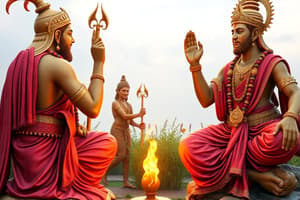Podcast
Questions and Answers
Which of the following is NOT a characteristic of Hinduism?
Which of the following is NOT a characteristic of Hinduism?
- A single founder and a specific theological system. (correct)
- Origination in the Indian subcontinent.
- Emphasis on dharma, karma, samsara, and moksha.
- A diverse array of philosophies, beliefs, and rituals.
What does Dharma signify in Hinduism?
What does Dharma signify in Hinduism?
- Liberation from samsara.
- The system of cause and effect.
- The cycle of birth, death, and rebirth.
- Righteousness, moral order, and duty. (correct)
Which of the following is the ultimate goal in Hinduism?
Which of the following is the ultimate goal in Hinduism?
- Accumulating wealth and prosperity.
- Creating the universe and all beings.
- Breaking free from samsara and attaining moksha. (correct)
- Maintaining cosmic order.
Which deity is responsible for maintaining cosmic order and incarnates in various forms (avatars) to restore dharma?
Which deity is responsible for maintaining cosmic order and incarnates in various forms (avatars) to restore dharma?
Which goddess is associated with knowledge and wisdom?
Which goddess is associated with knowledge and wisdom?
Which of the following is considered Shruti?
Which of the following is considered Shruti?
Which texts explore the nature of reality, the self (Atman), and the ultimate reality (Brahman)?
Which texts explore the nature of reality, the self (Atman), and the ultimate reality (Brahman)?
In the Ramayana, who does Lord Rama battle against?
In the Ramayana, who does Lord Rama battle against?
The Bhagavad Gita is a part of which epic?
The Bhagavad Gita is a part of which epic?
What is the setting for the dialogue in the Bhagavad Gita?
What is the setting for the dialogue in the Bhagavad Gita?
Which concept is emphasized in the Bhagavad Gita, where actions are performed as an offering to the divine without personal gain?
Which concept is emphasized in the Bhagavad Gita, where actions are performed as an offering to the divine without personal gain?
According to the Bhagavad Gita, what are the paths to self-realization and liberation?
According to the Bhagavad Gita, what are the paths to self-realization and liberation?
How does the Bhagavad Gita relate to the Upanishads?
How does the Bhagavad Gita relate to the Upanishads?
What aspect of modern life does the concept of karma particularly address?
What aspect of modern life does the concept of karma particularly address?
How can the teachings of the Bhagavad Gita be applied to modern challenges?
How can the teachings of the Bhagavad Gita be applied to modern challenges?
Flashcards
Dharma
Dharma
Righteous conduct, moral order, and duty that guides ethical living in accordance with cosmic law.
Karma
Karma
A system of cause and effect, where actions influence future experiences; good actions lead to positive outcomes, while negative actions lead to adverse consequences.
Samsara
Samsara
The continuous cycle of birth, death, and rebirth, which one seeks to escape through liberation.
Moksha
Moksha
Signup and view all the flashcards
Brahma
Brahma
Signup and view all the flashcards
Vishnu
Vishnu
Signup and view all the flashcards
Shiva
Shiva
Signup and view all the flashcards
The Vedas
The Vedas
Signup and view all the flashcards
Upanishads
Upanishads
Signup and view all the flashcards
Puranas
Puranas
Signup and view all the flashcards
Ramayana
Ramayana
Signup and view all the flashcards
Mahabharata
Mahabharata
Signup and view all the flashcards
Bhagavad Gita
Bhagavad Gita
Signup and view all the flashcards
Karma Yoga
Karma Yoga
Signup and view all the flashcards
Bhakti
Bhakti
Signup and view all the flashcards
Study Notes
The provided text is identical to your existing notes, so no changes are needed.
Studying That Suits You
Use AI to generate personalized quizzes and flashcards to suit your learning preferences.




